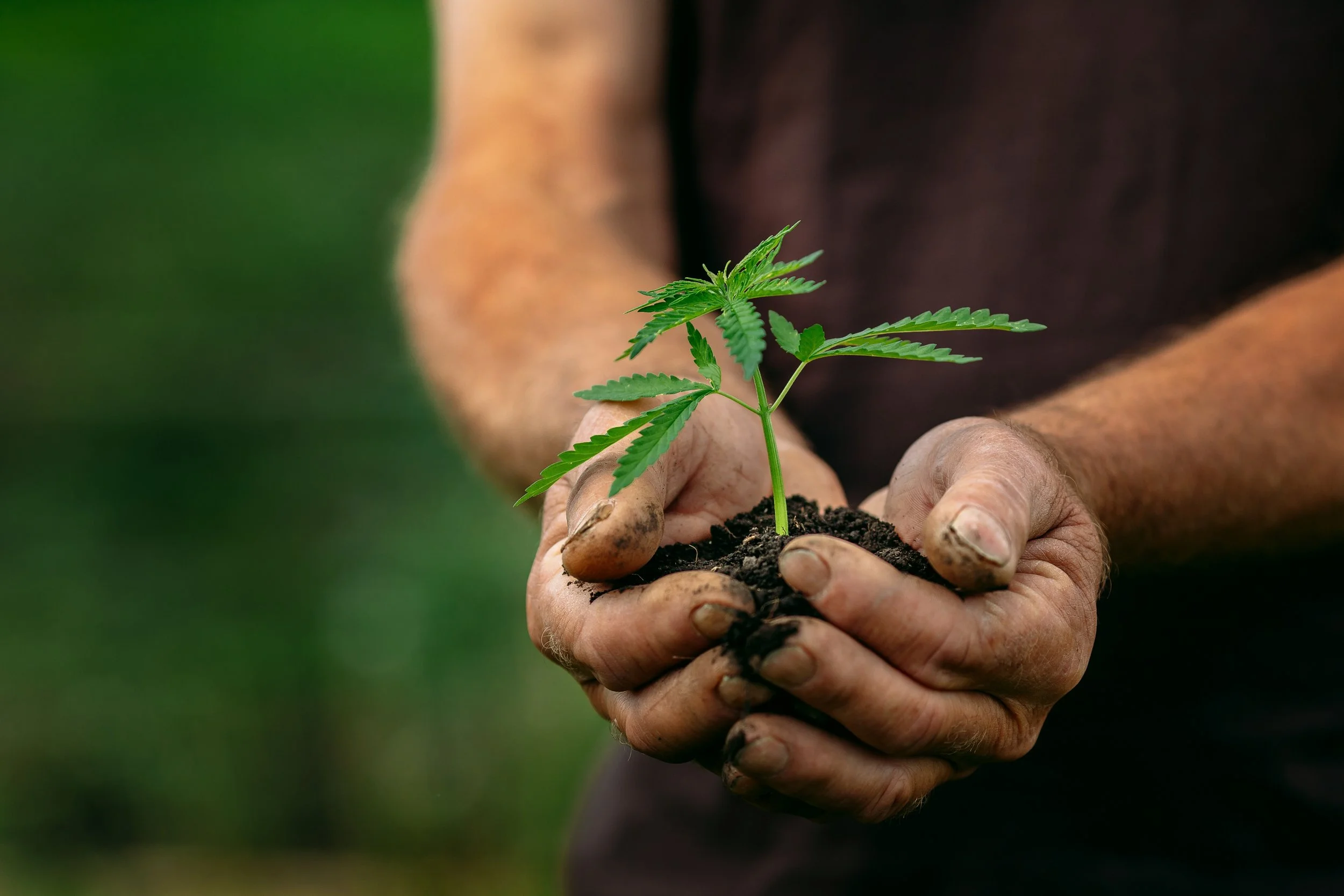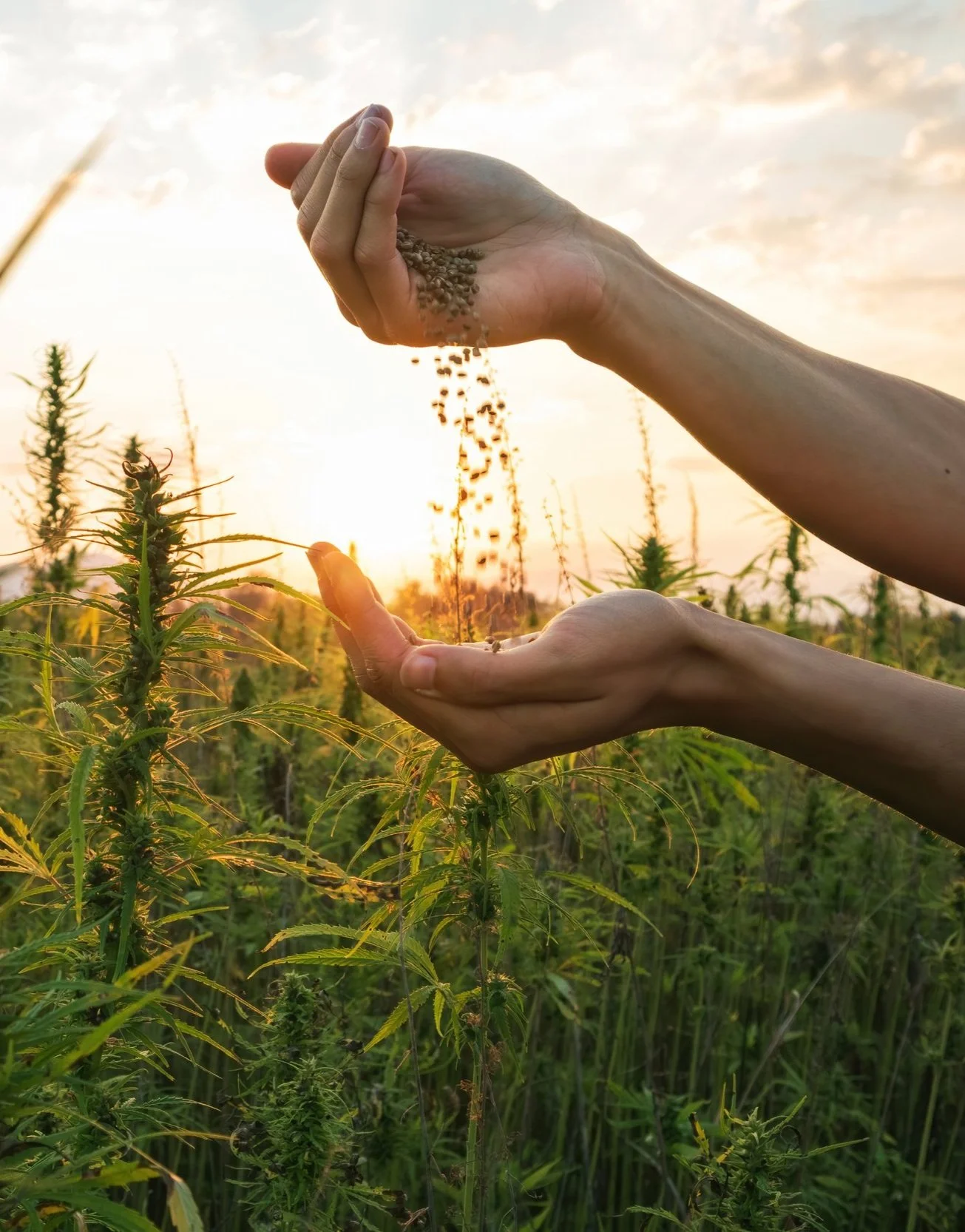About Hemp
Hemp is one of the world’s oldest and most versatile crops—cultivated for thousands of years for its strong fibres, nutrient-rich seeds, and wide range of practical uses. A variety of the Cannabis sativa plant, hemp is naturally low in THC, the compound responsible for the intoxicating effects of cannabis, making it safe and legal to grow under strict regulations in many countries, including the UK.
Today, hemp is experiencing a powerful resurgence as people rediscover its environmental, nutritional, and industrial value. From sustainable building materials and biodegradable plastics to health supplements and eco-friendly textiles, hemp offers real solutions to modern challenges and it's being recognised as a key player in a more sustainable future.
HEMP IS NOT MARIJUANA
While they come from the same plant species, Cannabis sativa L., Hemp is a versatile plant cultivated for thousands of years for its fiber, seeds, and oil. Unlike its close relative marijuana, hemp contains very low levels of THC (tetrahydrocannabinol), the psychoactive compound that produces a "high." Instead, hemp is prized for its industrial and nutritional uses. Historically, hemp has been used to make rope, textiles, and paper, and it played a significant role in early global trade. Today, it is recognised as a sustainable crop with over 25,000 other practical applications, including; construction, fuel, food and cleaning up the environment (our passion).
Key Definitions
-
Hemp commonly refers to Cannabis Sativa plants. It is is grown primarily for its non-intoxicating uses, including food, fibre, medicine, and materials. It is genetically distinct from high-THC cannabis and is typically bred to have very low levels of THC, the compound responsible for the "high."
Not all hemp is used industrially—some is grown for nutritional or therapeutic purposes (like CBD extraction), especially in wellness or medicinal markets.
-
A class of hemp designed for industrial or agricultural use.
Unlike cannabis, hemp contains only trace amounts of THC (tetrahydrocannabinol), the psychoactive compound that gets people "high." Legally, industrial hemp typically must contain less than 0.2% THC THC by dry weight.
The British Hemp Alliance is pushing for 1% THC.
-
Delta-9-tetrahydrocannabinol (THC) is a cannabinoid within the cannabis plant which is the chemical responsible for the psychoactive effects of cannabis (the "high") .
THC works by interacting with the body’s endocannabinoid system, specifically the CB1 receptors in the brain. This interaction influences a variety of physical and mental functions, including mood, appetite, memory, and sensory perception.
THC can also have unwanted side effects, especially at higher doses. Some individuals may experience anxiety, paranoia, or cognitive impairment while under the influence of THC.
THC is classified as a Class B controlled substance in the UK, meaning it's illegal to possess, produce, or supply it without a specific medical prescription or license. In medical contexts, THC is sometimes used as part of prescribed medical cannabis treatments.
-
Cannabidiol (CBD) is one of the most prevalent active ingredients in cannabis and does not cause a ‘high’. It is derived directly from the hemp plant, and is believed to be promising in alleviating pain, and in treating conditions such as anxiety, inflammation, pain, and sleep disorders.
CBD interacts with the body’s endocannabinoid system, which helps regulate processes like mood, immune response, and homeostasis, but it doesn’t bind strongly to the same brain receptors that THC does—this is one reason why it doesn’t have intoxicating effects.
In the UK, CBD is legal as long as it meets specific regulatory requirements. It must not be sold as having medical benefits unless it’s approved as a medicine. Over-the-counter CBD products are typically sold as food supplements and must not contain controlled cannabinoids like THC
Hemp Benefits
Hemp is one of the most versatile, prolific & synergistic tools available to tackle key environmental challenges, such as CO2 & land contamination.
Hemp bio-remediates contaminated soil, improves soil structure & nutrient levels, and can lead to greater yields in follow-on crops, such as wheat.
Hemp grows without the need for pesticides or herbicides & needs minimal water. It’s one of the most effective CO2 offsets, as it can grow up to 5 metres in only 3-4 months.
Hemp is a sustainable raw material & can make approximately 10,000+ environmentally responsible & bio-degradable products including plastics, fuel & fibre.
Most importantly Hemp can empower small local communities by providing local manufacturing & industry.
Industrial Uses of Hemp
Uses of Hemp
Hemp is one of the most versatile plants on Earth, with applications spanning multiple industries:
Textiles: Hemp fibers are strong, durable, and naturally resistant to mold and UV rays, making them ideal for clothing, bags, and upholstery.
Paper: Hemp pulp can be used to produce paper that is more sustainable and longer-lasting than wood-based paper.
Construction: Hempcrete, a mixture of hemp hurds (the inner woody core) and lime, is a lightweight, insulating, and eco-friendly building material.
Food: Hemp seeds and oil are rich in protein, healthy fats, and essential nutrients, making them a popular addition to diets.
Biofuels: Hemp can be processed into biodiesel and ethanol, offering a renewable energy source.
Plastics: Hemp-based bioplastics are biodegradable and can reduce reliance on petroleum-based plastics.
Hemp is a champion of sustainability and environmental health:
Fast Growth: Hemp grows quickly, reaching maturity in just 3-4 months, making it a highly efficient crop.
Soil Health: Hemp has deep roots that prevent soil erosion and can even remediate contaminated soil by absorbing toxins (a process called phytoremediation).
Carbon Sequestration: Hemp absorbs large amounts of CO2 from the atmosphere, helping to combat climate change.
Low Water Usage: Compared to crops like cotton, hemp requires significantly less water to grow.
Pesticide-Free: Hemp is naturally resistant to pests, reducing the need for harmful chemical pesticides.
Hemp Farming and the Environment
Legal Status and The Future of Hemp
The legal landscape for hemp has evolved significantly in recent years:
2018 Farm Bill (U.S.): This legislation legalised the cultivation and sale of industrial hemp, defining it as cannabis with less than 0.3% THC by dry weight.
Global Regulations: Many countries, including Canada, Australia, and members of the European Union, have also legalised hemp production for industrial and commercial use.
Economic Potential: The global hemp market is growing rapidly, driven by demand for sustainable products, CBD, and hemp-based foods. Experts predict continued expansion as more industries recognise hemp's potential.
Research and Innovation: Ongoing research is uncovering new uses for hemp, from biodegradable plastics to advanced medical applications, paving the way for a greener future.
Learn about the CHCx3 project research aiming to help UK farmers and growers target Net Zero or read more about Hemp research in our Library






